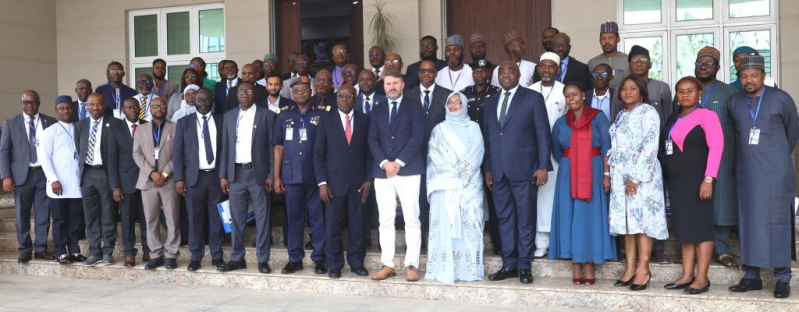
Reported by: Oahimire Omone Precious | Edited by: Gabriel Osa
The Executive Chairman of the Economic and Financial Crimes Commission (EFCC), Ola Olukoyede, has urged increased collaboration between the public and private sectors to tackle money laundering, terrorist financing, and proliferation financing (ML|TF|PF) in Nigeria.
The call was made in Abuja on Tuesday, September 30, 2024, during a Roundtable Discussion on “Developing Public-Private Partnership (PPP) Model to Combat Financial Crimes in Nigeria.” The event was organized by the Nigeria Financial Intelligence Unit (NFIU) in partnership with the British High Commission.
Olukoyede, who was represented by his Special Adviser on Regulatory Compliance, Francis Usani, emphasized that adopting a structured public-private partnership framework is essential for coordinated action against the growing threats posed by financial crimes. He noted that both public and private entities suffer the damaging effects of such activities and that a collaborative approach is the most effective way to combat them.
“For us at the Economic and Financial Crimes Commission, we are stopping at nothing to enforce every extant regulation to fight the scourge of money laundering, terrorist financing, and proliferation financing. I urge players in the public and private sector to partner more functionally with all the regulatory bodies to make a good success of the existing regulations. The regulations and sanctions accompanying them are meant for compliance and deterrence,” Olukoyede said.
He stressed that for a public-private partnership to be effective, institutions must strengthen internal vigilance, ensure continuous financial sanitation, and maintain compliance with relevant regulations. “Partnership is functional when capacities are built, systems are strengthened against infractions, and regulations are understood and obeyed. There is no better way of building a meaningful platform,” he added.
Olukoyede further assured that the EFCC remains ready to collaborate with all stakeholders to combat economic and financial crimes and other acts of corruption in Nigeria.
Speaking at the event, the Chief Executive Officer of NFIU, Hajiya Hafsat Bakari, acknowledged the critical role of both sectors in Nigeria’s fight against financial crimes and highlighted the country’s progress toward exiting the Financial Action Task Force (FATF) Grey List.
“No single institution, either public or private, can combat the scale and sophistication of financial crimes alone. Countries across the world, including the United Kingdom, South Africa, Australia, and India, have successfully leveraged public-private partnership models to strengthen their AML/CFT regimes. Silo approaches are no longer sufficient. We must move towards a partnership that builds trust and encourages real intelligence sharing,” Bakari said.
She expressed optimism that structured public-private partnerships would demonstrate Nigeria’s ability to bridge the gap between policy and implementation, noting that the nation could achieve a positive exit from the FATF Grey List as early as the end of October 2024.
The roundtable discussion underscored the importance of collaboration, institutional compliance, and capacity building as key drivers in strengthening Nigeria’s fight against financial crimes.
📩 Stone Reporters News
🌍 stonereportersnews.com | ✉️ info@stonereportersnews.com
📘 Facebook: Stone Reporters | 🐦 X (Twitter): @StoneReportNews


Add comment
Comments